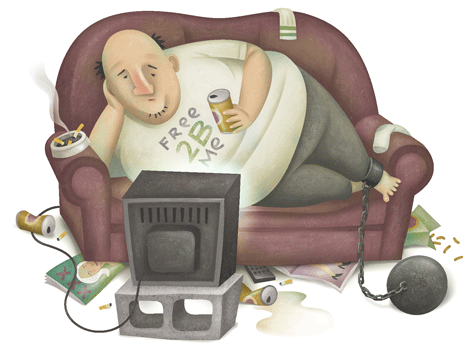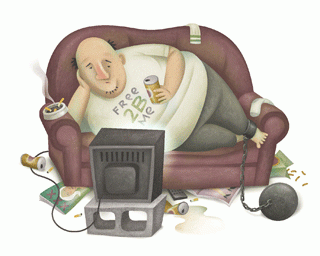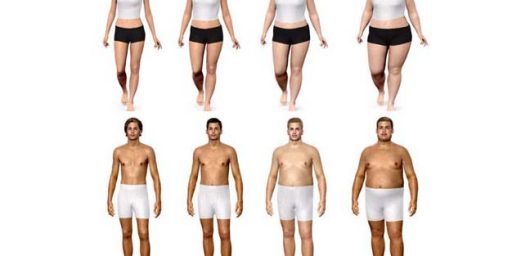Fat People, Smokers Have Lower Medical Bills
 Instead of lecturing smokers and the morbidly obese on their behavior, governments should encourage them.
Instead of lecturing smokers and the morbidly obese on their behavior, governments should encourage them.
Preventing obesity and smoking can save lives, but it doesn’t save money, researchers reported Monday. It costs more to care for healthy people who live years longer, according to a Dutch study that counters the common perception that preventing obesity would save governments millions of dollars.
[…]
The researchers found that from age 20 to 56, obese people racked up the most expensive health costs. But because both the smokers and the obese people died sooner than the healthy group, it cost less to treat them in the long run.
On average, healthy people lived 84 years. Smokers lived about 77 years, and obese people lived about 80 years. Smokers and obese people tended to have more heart disease than the healthy people. Cancer incidence, except for lung cancer, was the same in all three groups. Obese people had the most diabetes, and healthy people had the most strokes. Ultimately, the thin and healthy group cost the most, about $417,000, from age 20 on. The cost of care for obese people was $371,000, and for smokers, about $326,000.
So, really, it’s your patriotic duty to eat more and take up smoking. Your government needs the money.
Image: ToryDiary via Google






You might be on to something here. With all of the state universal health care plans being crushed under their higher than expected costs, a gimmick is needed to make a national health plan make sense.
But you don’t go far enough. You need to add unsafe sex to the study. Imagine the political payoff when you promote universal health care and promise to make it affordable by requiring people to eat hearty, smoke ’em if you got ’em and love the one your with. Talk about throwing red meat to the voters.
This was something that I’ve always wondered about. What’s so counterintuitive about healthy people living longer, and thus becoming a bigger drain on budgets for Medicaid, Medicare, and Social Security? I’ve always believed that the government should be neutral on smoking as a matter of public health, and tax the consumption of cigarettes to subsidize the health costs associated with respiratory illnesses. Same for alcohol and all other “vices.”
Yes, but what do they contribute? If a healthy person works more years than an obese person, or earn more money than an obese person, they could be paying more in taxes than an obese person and in theory contributing to GDP more than an obese person.
Give me the net cost of each lifestyle to our society, not the gross (pun semi-intended) cost.
Death also reduces your carbon footprint–tell that to Al Gore!
I guess that makes sense, although I’m a little surprised that the differences in final cost aren’t further apart.
If it’s our patriotic duty to smoke and get fat, I’d like to see a study that analyzes whether it’s cheaper to buy cigarettes and additional food or pay more taxes.
Then I’ll make my decision about smoking and overeating.
You’re confused about what “public health” is in this country. Public health in the United States concerns itself almost exclusively with the prevention and suppression of communicable diseases, primarily TB, AIDS and other STDs.
Short of taxing tobacco (the purpose of which isn’t primarily about discouraging consumption) and requiring warning labels (a passive discouragement at best) the government is effectively “neutral” on using tobacco products.
Actually, the government has been promoting a rather aggressive anti-smoking education campaign as long as I can remember.
I guess that would depend on your definition of “aggressive”. Certainly because they campaign against tobacco they aren’t definitely “neutral” but taking out TV ads and suggesting that we don’t smoke or banning vending machines isn’t particularly aggressive. Given that the top four leading causes of death in the US are often related to tobacco use I would say this response is pretty mild.
Arresting and incarcerating active TB patients who show up in public places is quite aggressive however. This happens on a fairly regular basis BTW, and it only makes the news when the person arrested isn’t homeless.
And I’m not arguing against this per se. I’m simply pointing out the phrase “public health” is used incorrectly to include all kinds of things it doesn’t encompass, like health care and tobacco suppression and other “personal” health issues on which the government is, in my opinion, effectively a neutral party.
Michael;
Your comment proves a very salient point.
No argument, legitimate or not,will EVER dissuade those who wish to forcibly micro-manage other people’s lives.
The only hope is to prevent these obsessive anal-retentive types from gaining control in the first place.
“If a healthy person works more years than an obese person, or earn more money than an obese person, they could be paying more in taxes than an obese person and in theory contributing to GDP more than an obese person.”
I’m always struck by the variable definition of the term “earn” in our society.
Digging a ditch or turning a nut or designing an airplane is valued far less than the “earnings” from the completely passive and uninvolved return on money the investor sees.
The ditchdigger’s vocation speeds products to market, the nut-turner fastens the worlds products together, the engineer designs the vehicles to carry these products. The investor…he provides the capital for these endeavors.
Well, fair enough.
But can the investor dig a ditch? turn a nut? design an airframe? Probably not. Can a ditchdigger sit on his butt and collect dividends? You betcha.
Makes me wonder why the investor is so exalted and the laborer so despised.
jim;
An awful large percentage of those investors, spent forty years digging ditches, turning nuts,and designing airplanes, so that they could retire and be the investors, living on the returns on their savings which were hard earned with calloused hands.